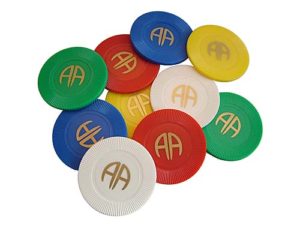What makes AA effective?
Please note: For what they are worth, these comments represent Debbie’s opinions and perceptions based upon her own experiences and must be understood as such. Thank you…
Here are more of my thoughts about the Fellowship of AA.
- What are chips all about?
 Well, they are a way for the AA program to demonstrate its commitment to you and to mark your progress with the challenge of sobriety. They are a way of making a public announcement of how successful you have been. In the beginning, you pick up a chip; If you have made it 30 days, you often pick up another chip. (These are, most of the time, poker chips, just round plastic disks, a size you can put in your pocket.) Then, as time goes on, you pick up a yellow chip, a blue chip, a red chip, etc. The colors are not set in stone, and the idea of having chips at all is not mandatory. Some groups have them, some do not.
Well, they are a way for the AA program to demonstrate its commitment to you and to mark your progress with the challenge of sobriety. They are a way of making a public announcement of how successful you have been. In the beginning, you pick up a chip; If you have made it 30 days, you often pick up another chip. (These are, most of the time, poker chips, just round plastic disks, a size you can put in your pocket.) Then, as time goes on, you pick up a yellow chip, a blue chip, a red chip, etc. The colors are not set in stone, and the idea of having chips at all is not mandatory. Some groups have them, some do not.
As you walk around with a chip as your pocket piece, it reminds you of AA’s faith in you and in your success.
Sometimes, if someone picks up a chip signifying long sobriety, say 10 years or more, there will be a tiny presentation ceremony and a great deal of applause and merriment.
- What are the steps?
 Well, the AA principles of sobriety are built on 12 steps that people who “work the program” believe in. The founders of AA (1936, Mr. Bill Wilson and Dr. Bob) figured out the steps as being the way to move yourself from addiction to sobriety. Most people who are successful in AA understand that they are alcoholic even if they have been sober in the program for 30 years. They understand that they are just one step away from beginning to drink again, and most of them study and meditate on the steps daily. The steps are challenging, of course. And difficult to carry out. Some are harder than others. For example, for one of the steps you must make an honest and fearless inventory of the names of all people you have wronged. Does this sound like an exercise in humility? You bet! Good for the soul and good for your future sobriety.
Well, the AA principles of sobriety are built on 12 steps that people who “work the program” believe in. The founders of AA (1936, Mr. Bill Wilson and Dr. Bob) figured out the steps as being the way to move yourself from addiction to sobriety. Most people who are successful in AA understand that they are alcoholic even if they have been sober in the program for 30 years. They understand that they are just one step away from beginning to drink again, and most of them study and meditate on the steps daily. The steps are challenging, of course. And difficult to carry out. Some are harder than others. For example, for one of the steps you must make an honest and fearless inventory of the names of all people you have wronged. Does this sound like an exercise in humility? You bet! Good for the soul and good for your future sobriety.
- What is a sponsor?
 A sponsor is a person who has been in the fellowship for a while and a person whom others look up to as having been successful at getting and maintaining sobriety. It is a person who is available to you, on a personal confidential basis, to help you maintain sobriety. The sponsor knows the steps and knows you, too. Their job is to keep you on track with your sobriety, and remind you that you do not struggle in isolation. The relationship with a supportive sponsor feels like unconditional love; it is an experience in self-discovery and helps you build confidence in your ability to learn, grow and change.
A sponsor is a person who has been in the fellowship for a while and a person whom others look up to as having been successful at getting and maintaining sobriety. It is a person who is available to you, on a personal confidential basis, to help you maintain sobriety. The sponsor knows the steps and knows you, too. Their job is to keep you on track with your sobriety, and remind you that you do not struggle in isolation. The relationship with a supportive sponsor feels like unconditional love; it is an experience in self-discovery and helps you build confidence in your ability to learn, grow and change.
AA was invented long before it became fashionable to seek psychotherapy. It used to be a last stop on the train of desperation. Not sure it is that for everyone today. Culture and society have changed. But here is an interesting idea: Some people have said that AA is the best place to go for healing therapy, even if you don’t exactly have an addiction…. dhc
